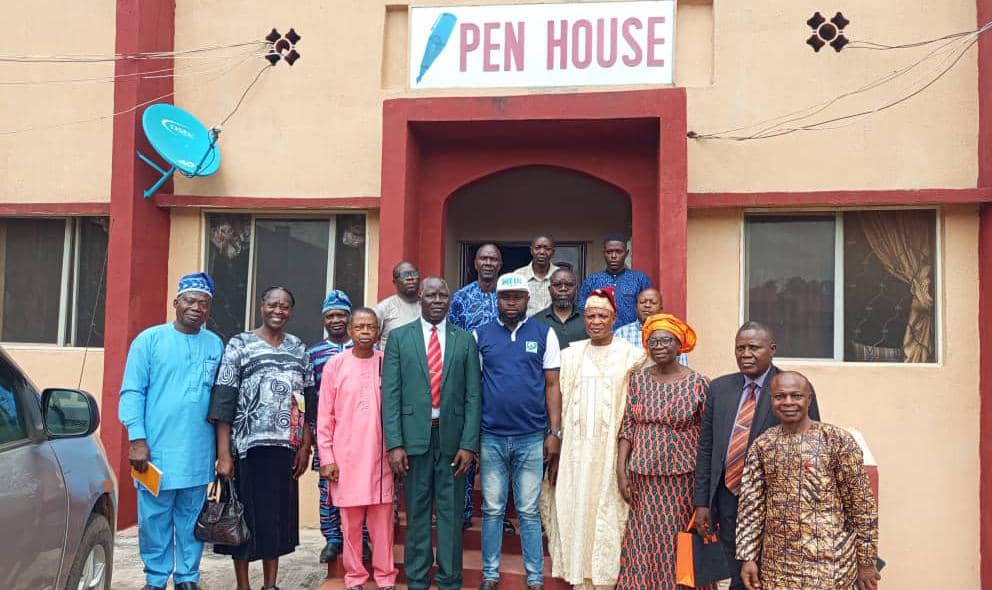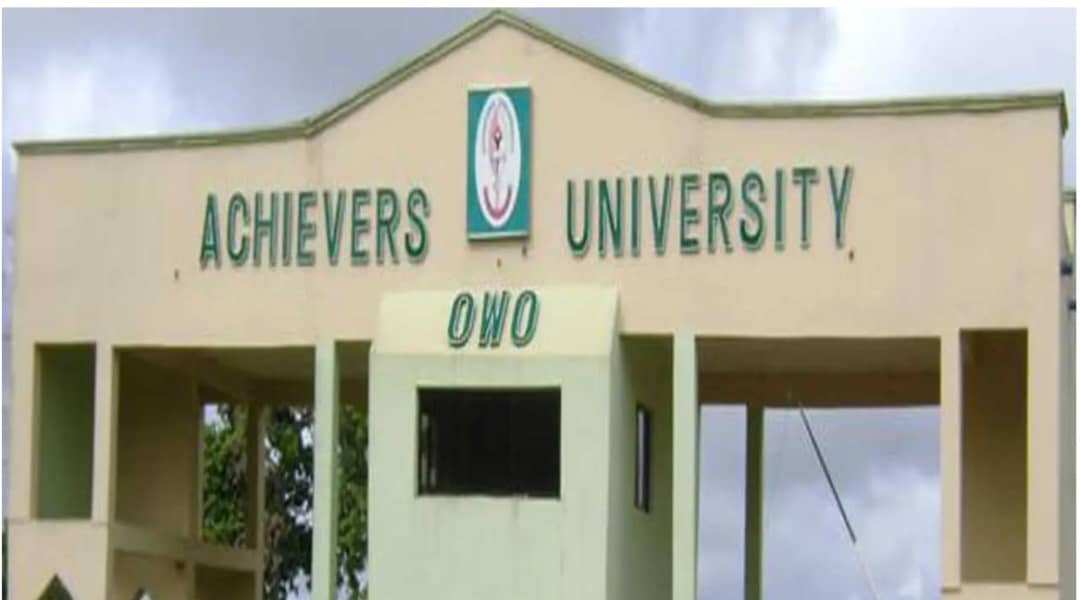By: Ade Adeleke
The Director general, National Space Research And Development Agency, NASRDA, Dr Halilu Ahmad Shaba has advocated that rural communities in Nigeria should play a critical role in global efforts to mitigate and adapt to climate change to ensure food security.
Dr Shaba however said to achieve the target, it is essential to empower communities with knowledge and resources, that would sustain their agricultural practices and build resilience to climate-related challenges. .
The Director General, stated this on thursday 12th October, 2023 while delivering annual public lecture of Ulefunta Festival held at Obafemi Awolowo Auditorium, Federal University of Technology, Akure (FUTA) in Akure, the Ondo State Capital.
He spoke on a title; “CLIMATE CHANGE AND FOOD SECURITY IN NIGERIA: THE ROLE OF RURAL COMMUNITIES IN GLOBAL MITIGATION AND ADAPTATION MEASURES”.
Dr Shaba stated that climate change had disrupted agricultural systems thereby leading to food shortage, noting that a collaboration among governments, NGOs, international organizations, and local communities is key to addressing these interconnected challenges effectively.
He therefore posited that for the country to secure food production then the governments should work in collaboration with rural communities to develop and implement adaptation of crop varieties to changing weather patterns.
The DG also charged government at all levels to mitigate against causes of climate change that has led to food insecurity in the country.
Dr Shaba said, “as an important global issue, food security has a close relationship with human health, nutrition, climate, and other factors. Food insecurity, usually associated with low incomes, denotes a lack of regular access to enough food and the consumption of nutrient-poor diets, which could contribute to the development of diseases such as obesity, heart disease, hypertension, diabetes, and other chronic diseases.
“Effects of Climate Change and Food Security for Nigeria Climate change and food security are interlinked challenges with significant implications for Nigeria, particularly its rural communities. Nigeria, like many other countries, faces the adverse effects of climate change, including rising temperatures, erratic rainfall patterns, increased frequency of extreme weather events, sea-level rise, land degradation and rapid desertification in the Northern part of the country.
“These changes have disrupted agricultural systems, impacted food production negatively and threatened the livelihoods of millions of people, especially those in rural areas who depend on agriculture for sustenance. Studies have found that recurring environmental disasters in parts of Nigeria have worsened food productivity and human suffering over the past decade.
“Many research findings point to the fact that climatic vagaries brought about by climate change have adverse effects on agricultural productivity in Nigeria, leading to reduced outputs. This situation has resulted in shortfalls and disruptions in food supply, causing food prices to rise.
“The era of food insecurity is intensifying across Nigeria due to climatic factors that limit agricultural productivity. Climate change-induced alterations such as droughts, heavy precipitation, flooding of farmlands, rising temperatures, increasing aridity, soil acidity changes, changes in relative humidity, increased evaporation, and others have adverse effects on agricultural productivity and food systems in Nigeria.
“Studies have noted that climate change has become an everyday reality in Nigeria, with growing intensity and increasing frequency of environmental issues such as floods, droughts, rising temperatures, and extreme weather events that disrupt agricultural activities. In 2012 and 2022, severe flooding was recorded in many parts of Nigeria, leading to significant losses in human lives, crops. livestock and human displacement
“The changes in environmental conditions brought about by climate change affect the various vegetative zones of Nigeria differently. In the semi-arid Sudan and arid Sahel Savannah region, they bring about reduced rainfall, drought, and increasing desertification.
“The Role of Rural Communities in Global Mitigation and Adaptation Measures Rural communities play a vital role in global mitigation and adaptation measures related to climate change and various environmental challenges.
“Their role is particularly significant because many rural areas are highly dependent on natural resources for their livelihoods, making them both vulnerable to climate change and essential actors in addressing it. The role of rural communities in global mitigation and adaptation measures concerning climate change and food security in Nigeria.
“Agriculture as a Major Contributor to Emissions: Agriculture is a major contributor to greenhouse gas emissions, primarily through activities such as deforestation, livestock production and the use of synthetic fertilizers. In Nigeria, rural communities often engage in traditional farming practices that may not be sustainable in the long term.
“Encouraging and supporting these communities in adopting climate-smart agricultural practices can help mitigate emissions: Promotion of Climate-Smart Agriculture: Rural communities can play a pivotal role in mitigating climate change by adopting climate smart agricultural techniques. These practices focus on sustainable land management, crop diversification, improved irrigation methods, and the use of organic fertilizers, NGOs, government agencies, and international organizations can provide training
“Community-Based Adaptation: Engaging rural communities in the planning and implementation of adaptation measures is crucial They often have valuable traditional knowledge and practices that can be integrated into adaptation strategies.
“Market Access and Value Chains: Strengthening rural value chains and market access can help rural communities generate income and improve food security. This can include support for post-harvest handling and storage to reduce food wastage.
“Recommendations and Conclusion: Space technology serves as the bottom-line in the fourth industrial revolution that has commenced with the artificial intelligence and robotics applications in all human endeavours. I am privilege to superintend over the Nigeria Space Policy and Program. This vintage position gave me better understanding on the connectivity of space technology, climate change and food security as it affects one another both positively and negatively.
“More succinctly, space technology is a tool to achieve better result in the pursuit of delicate balance between these intertwined issues; conclusion, rural communities in Nigeria play a critical role in global efforts to mitigate and adapt to climate change while ensuring food security.
“To achieve these objectives, it is essential to empower these communities with knowledge, resources, and support to transition to sustainable agricultural practices and build resilience to climate-related challenges. Therefore, collaboration between governments, NGOs, international organizations, and local communities is key to addressing these interconnected challenges effectively,” Dr Shaba recommended.
Addressing the audience, Vice Chancellor, University of Technology Akure, FUTA, Prof Adenike Oladiji who thanked Akure community for supporting the university’s development said the university had engaged in activities that had reduced forestation in the communities.
In a royal welcome address, the Deji of Akure Kingdom, Oba Aladetoyinbo Aladelusi Ogunlade, pointed out that August break in Nigeria had been broken hence government needed to do something urgently to address climate change affecting the masses.
Oba Aladetoyinbo said he would continue to use the festival to promote love, unity and development of Akure kingdom and her people.
In an opening speech, the Chairman of the occasion, deputy director, institute of food security, environmental resources and agricultural research, Federal University of AGRICULTURE, Abeokuta, Dr John Oyedepo urged every individual to be weary of their activities in order not to worsen the climate change.
Earlier, Chairman Ulefunta 2023 steering committee, Olu Adekunle Ajanaku said the Ulefunta festival had done a lot to develop the capital City.
This year’s Ulefunta celebration also conferred awards on Nigerians who had contributed immensely to humanity service in the country while the presentation of prize to the winners of Ulefunta Essay Competition was also performed by Oba Aladetoyinbo.











